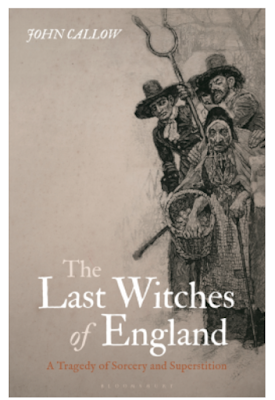I received a digital version of this book from NetGalley in exchange for a review. All thoughts and opinions are fully my own. Thanks for reading.
I've long been fascinated by a local case in my town, of a woman accused of witchcraft in 1634. The story is echoed in similar scrawlings in court records up and down the country: A woman called Edith Wills responds to a man in the town's marketplace in annoyance, and they're soon bickering angrily in front of the other shoppers buying their meat, fish and cheese. The man wanders home, muttering about the woman under his breath, and locks his wooden door shut. The next day he falls down in random "shaking fittes" and incoherent shrieks and mumbles in front of his wife, complaining that it feels as if a mouse is running around under his skin. The couple, looking for a cause, become convinced that he has been cursed by the angry woman in the market place and a local investigation into witchcraft begins.
In this case, the records are sketchy. It seems to have been resolved quickly, and there's no record of an execution or any further investigation. I've always wished I could glean a little more from this story, see things from a wider perspective and relate to Edith - and others who faced similar events - a little more.
And then I found this book.
The Last Witches of England, by John Callow, investigates the cases of the last women to be executed in England, in 1682. They are Temperence Lloyd, Susanna Edwards and Mary Trembles, and they lived in Bideford in Devon.
The book is extremely well-researched and employs some vivid imagery to help set the scene: at times I really felt as if I was looking down on late seventeenth-century Bideford. A lot of care is taken to put these women into the perspective of their surroundings, right down to their relationships with townspeople and the piles of rubbish that built up in the streets of the town.
Callow argues that there was a set of particular circumstances that swirled around these three women, which lead to their suspicion, arrest and eventually, their executions. These range from religious, political, social and personal circumstances. By putting the women into their local and national context, it gives a much more rounded picture of how they came to be targeted by their neighbours and local government. The main theme throughout the book was that the women were poor and so lived on the edge of society - but this wasn't the only reason, and this part of the book makes really fascinating reading.
The stories of these women are handled with respect and dignity, and inconsistencies recorded in their cases are highlighted. I enjoyed the spotlight on those in power who didn't believe in witchcraft and some fraudulent claims that were being discovered at the time. An accusation of witchcraft could ruin an individual and their family and it seems that enemies went to great lengths to try and get a claim passed in court. The final chapters deal with the legacy of the Bideford witches, from being ridiculed and feared in their lifetimes, to their commemoration in more recent times, where they are viewed with compassion.
But has it taught me more about Edith Wills and the other people (they were often women, but not always) that were accused of bewitchment in the seventeenth century?
I think it has.
After reading the book, I see the way suspicions of witchcraft whipped neighbours up against each other. I see how chance encounters were spun together in an attempt to create some kind meaning that someone must have been to blame. I can see now how not only local but national policies and events could sprinkle fuel onto the early crackles of a witchcraft craze. And I have a much better grasp on a world where it was dangerous to be at the centre of any disagreement, negative reaction or something as simple as knocking on a door while a bird flies through a window above.
A great book, and I can fully recommend it. Ask for it at your local bookshops or you can find it on Amazon here (affiliate link): The Last Witches of England, by John Callow.
You might also like: The Witches of Reading, How Charles II Dealt with the Plague Outbreak in 1665 and Sex and Sexuality in Stuart Britain.
Have you read the book? Let me know what you think in the comments below...



















0 Comments